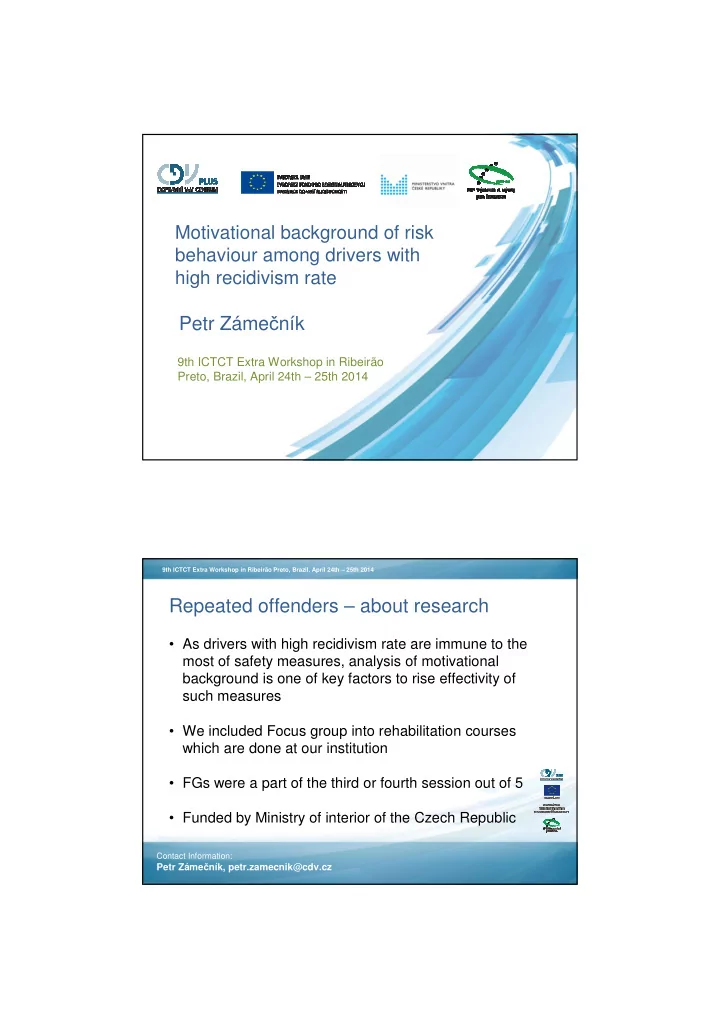

Motivational background of risk behaviour among drivers with high recidivism rate Petr Záme č ník 9th ICTCT Extra Workshop in Ribeirão Preto, Brazil, April 24th – 25th 2014 9th ICTCT Extra Workshop in Ribeirão Preto, Brazil, April 24th – 25th 2014 Repeated offenders – about research • As drivers with high recidivism rate are immune to the most of safety measures, analysis of motivational background is one of key factors to rise effectivity of such measures • We included Focus group into rehabilitation courses which are done at our institution • FGs were a part of the third or fourth session out of 5 • Funded by Ministry of interior of the Czech Republic Contact Information: Petr Záme č ník, petr.zamecnik@cdv.cz
9th ICTCT Extra Workshop in Ribeirão Preto, Brazil, April 24th – 25th 2014 Research - content 5 base topics were discussed during FGs •What do you see as the main risks arising from traffic and how often do you meet them? •What is your personal definition of risk and how often you behave this way? •Are there any signs that tell you that you are driving in inappropriate risk? •What do you do for not behaving risky? •What government do for safer roads, do you see any action? Are the measures effective? Contact Information: Petr Záme č ník, petr.zamecnik@cdv.cz 9th ICTCT Extra Workshop in Ribeirão Preto, Brazil, April 24th – 25th 2014 Results – well known fact Some known things were confirmed •Participants consider skills as a main source of safety behaving (first two levels of GDE) •As a risk behavior they see other than own offences •Lacking social responsibility and positive attitudes towards traffic safety Contact Information: Petr Záme č ník, petr.zamecnik@cdv.cz
9th ICTCT Extra Workshop in Ribeirão Preto, Brazil, April 24th – 25th 2014 Results – types of repeated offenders There are basicaly three kinds of clients in our RP 1)Unaware offenders (do not see any risk in their behavior) 2)„Yes but“ offenders (they are exception, it is risky when others driving) 3)Helpless offenders (not able or not willing to change behavior despite being aware of risk) Contact Information: Petr Záme č ník, petr.zamecnik@cdv.cz 9th ICTCT Extra Workshop in Ribeirão Preto, Brazil, April 24th – 25th 2014 Results – motivational background • These drivers need certain level of demands, need to handle complex situations and complications to be satisfied (well known from Watzlawick) • Offenders are oscilating between boredom and loosing control • Trying to be in the „flow“ and on appropriate level of risk • Golden rule of „two thirds“ – DUI, speeding and technical condition of car Contact Information: Petr Záme č ník, petr.zamecnik@cdv.cz
9th ICTCT Extra Workshop in Ribeirão Preto, Brazil, April 24th – 25th 2014 Results – motivational background Risk motivation, based on Yerkes-Dodson (1908) and Csikszentmihalyi (1990) Task Hyperexcitation, demand fear, discomfort Risk acceptance FLOW Boredom, discomfort Skills Contact Information: Petr Záme č ník, petr.zamecnik@cdv.cz 9th ICTCT Extra Workshop in Ribeirão Preto, Brazil, April 24th – 25th 2014 Results – motivational background • Discomfort from behaving according to rules is stronger than from the risk behavior • Lifestyle cause that they are perpetually in situations where they must behave in a risky way (combination of comfort, ingnorance and bad planning) • Risk behavior is learned behavior, they do not know how to behave alternatively – key role of personal strategy in frame of RP Contact Information: Petr Záme č ník, petr.zamecnik@cdv.cz
9th ICTCT Extra Workshop in Ribeirão Preto, Brazil, April 24th – 25th 2014 Results – motivation for change Under which condition repeated offenders will behave properly •Hard repression immediately after every offence ☺ •Alternative lifestyle (more easy to have another job than drive according to traffic rules) •Cultural change – towards the condition that risk behaving is socialy unacceptable (calling police on DUI drivers is considered as being „rat“ and „informer“) Contact Information: Petr Záme č ník, petr.zamecnik@cdv.cz 9th ICTCT Extra Workshop in Ribeirão Preto, Brazil, April 24th – 25th 2014 Conclusion and implications • Best feeling from driving when in flow (optimal performance) • High risk acceptance when being in flow • Repression has small effect as does not have power to change learned behavior and lifestyle • We are missing the fifth level of GDE matrix (cultural influence) as it can be a base for effective measures for repeated offenders • As the risk behavior is to high extent learned behavior our future research should focus on GDL and young drivers (where is the decision point to start behaving in risky way) Contact Information: Petr Záme č ník, petr.zamecnik@cdv.cz
9th ICTCT Extra Workshop in Ribeirão Preto, Brazil, April 24th – 25th 2014 Time for… • Questions • Remarks • And discussion Contact Information: Petr Záme č ník, petr.zamecnik@cdv.cz Thank you for your attention! Contact Information: Petr Záme č ník Petr.zamecnik@cdv.cz Transport Research Centre (CDV) Líše ň ská 33a, 636 00 Brno Czech Republic phone: +420 549 429 366 email: cdv@cdv.cz www.cdv.cz
Recommend
More recommend